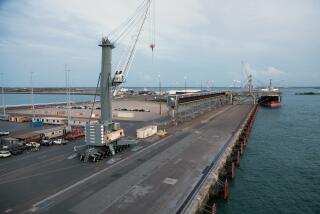U.S. Retaliates, Cancels New Zealand Maneuvers : Future of Defense Pact Uncertain
- Share via
WASHINGTON — The United States, expressing “grave concern” at New Zealand for denying port facilities to a nuclear-equipped U.S. warship, today canceled a naval exercise with Australia and New Zealand and hinted at further retaliation.
The cancellation, announced by White House spokesman Larry Speakes, appeared to jeopardize the 34-year-old ANZUS treaty signed by Australia, New Zealand and the United States as a mutual defense pact in the South Pacific.
The dispute was prompted by New Zealand’s rejection Monday--on the basis of its anti-nuclear policies--of a second U.S. request to permit the destroyer Buchanan to dock at one of its ports next month as part of the “Sea Eagle 1-85” exercise.
“We deeply regret the decision to deny port access to a U.S. Navy ship contributing to the common defense of the ANZUS alliance,” Speakes said. “This is a matter of grave concern that goes to the core of our mutual obligations as allies.”
Speakes said the United States is “considering the implications for our overall cooperation with New Zealand under ANZUS.” He said Australia is pulling out of the Sea Eagle exercise along with the United States.
“We are considering other actions that we might take,” Speakes added, “but at this time we have no further decisions and we have no further comment.”
State Department spokesman Bernard Kalb charged that anti-nuclear movements in “some Western countries . . . seek to diminish defense cooperation among the allied states.” He said the U.S. action is intended as a signal to other countries that actions like New Zealands’s are “not cost-free.”
Australia was to have been the host country for the maneuvers. Speakes said there was no immediate decision on whether the United States and Australia will go ahead with an alternate exercise in the area.
The controversy spawned by New Zealand’s anti-nuclear policies loomed as a major issue on the agenda for talks Thursday between Reagan and Australian Prime Minister Bob Hawke. New Zealand Defense Minister Frank O’Flynn said his government is expecting the withdrawal of U.S. military cooperation and aid in retaliation for its anti-nuclear policies.
“That is one of the costs of our nuclear policy, and I’m sure most New Zealanders will be willing to pay that price to see the government stand firm,” O’Flynn said.
In Wellington, New Zealand, Prime Minister David Lange called the cancellation of the exercise an “utterly expected consequence.”
“There is no doubt whatever that if we had welcomed in New Zealand a nuclear-armed vessel, then the exercise would have taken place. Therefore, the logic is, as we did not, those exercises are canceled.”
But, he said, “Certainly it is not the view of the New Zealand government that our policy is hopeful of being changed, backed down upon, because of actions like that.”
Lange’s Labor government, which swept into power in July on an anti-nuclear platform, has declared that it will not allow any nuclear-powered or armed vessels into New Zealand ports.
More to Read
Sign up for Essential California
The most important California stories and recommendations in your inbox every morning.
You may occasionally receive promotional content from the Los Angeles Times.













